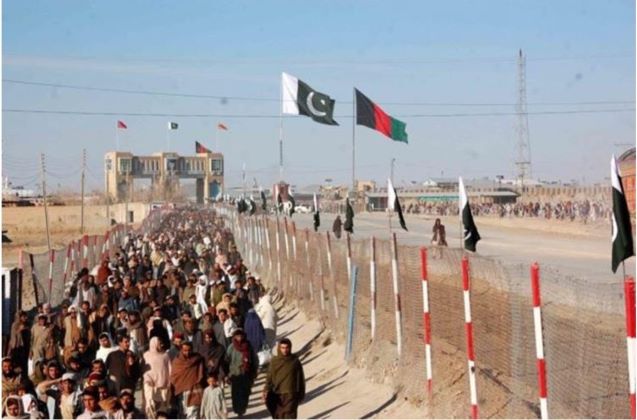Border tensions between Afghanistan and Pakistan are reaching to an unprecedented level after recent incidents of violence along the so-called ‘Durand Line’. On November 13, an armed man allegedly from the Afghan side opened fire on Pakistani security personnel at the Chaman/Spin Boldak border crossing – known as ‘Friendship Gate’ – resulted in the killing of one Frontier Corps soldier and injured two others. Consequently, Pakistan closed all business and trade activities at the Chaman border for over a week causing humanitarian crisis for the Pashtun population living on both sides of the border. After multiple flag meetings between the Taliban and Pakistani officials, the authorities reopened the border crossing on November 21. One year after the Taliban’s takeover of Kabul, border clashes between Afghanistan and Pakistan have increased manifold with no thaw in sight anytime soon.
There were media speculations that the Taliban had handed over the attacker to Pakistan to douse brewing tensions between the two neighbouring countries. However, it appears those reports were farcical, and instead the Taliban had rejected the claim saying, “We chose to sacrifice our government & thousands of comrades in resisting the US and international community instead of handing over a foreigner, Osama Bin Laden, so why would we hand over an Afghan to a neighbouring country.” Furthermore, the Taliban completely denied allegations that the assailant was one of their border guards, saying a probe was swiftly launched to locate and apprehend him.
In another border incident, seven people, including two children, were injured following alleged “firing from across the Afghan border” in Kharlachi and Borki near Kurram border. In a statement shared on Twitter, Federal Minister for Overseas Pakistanis and Human Resource Development Sajid Hussain Turi said on November 20: “Afghanistan’s violation of Pakistan’s Kurram border at Kharlachi and Borki and targeting the civilian population is condemnable.” On social media websites, pro-Taliban accounts shared ‘unverified’ videos of the Taliban fighters destroying pillars of barbed wire, installed by Pakistan, in Dand-e-Patan district of Afghanistan’s Paktia province. Additionally, some accounts claimed that a famous Taliban soldier, Mansoor, was killed by Pakistani forces in Paktia. He was reportedly “part of the Taliban’s laser units with extensive fighting experience under his belt over the last 20 years.”
It is noteworthy that Dand-e-Patan district has seen violent clashes between the Taliban fighters and Pakistan’s border security forces in September this year. The main reason for recurring border clashes is Pakistan’s one-sided and ‘illegitimate’ border fencing activities. On several occasions, the Taliban border forces have complained about Pakistan’s illegal attempts to capture the Afghan land on the pretext of fencing the Durand Line. Therefore, it leaves no choice for the Taliban but to use force against Pakistan’s security forces. Such incidents have increased insecurities in Islamabad, which fears that the unresolved border issue may jeopardise its ties with the Taliban, in turn impacting Pakistan’s anti-India “strategic depth” in Afghanistan.
Pakistan is resorting to trade blockades to pressure the Taliban’s interim government in Kabul on the Durand Line issue. As a land-locked country, Afghanistan has been historically dependent on Pakistan for bilateral and transit trade. Since the Taliban’s takeover in August 2021, Afghanistan’s economy has been on the verge of complete collapse. As a result, Kabul is now more dependent on Islamabad for trade and transit activities. This has allowed Pakistan to use its ‘economic’ leverage on Afghanistan to resolve the Durand Line issue in its favour. Nevertheless, the Taliban government and Afghan population have refused to budge on the matter. This has added frustration in Islamabad, which is worried about increasing Tehrik-i-Taliban activities in the erstwhile Federally Administered Tribal Agencies region.
Pakistan is going through an unprecedented economic crisis. Adding to that, the persistent political instability has only worsened the domestic situation. Under these circumstances, Islamabad is facing emerging security situation in border provinces and an assertive Taliban, which is unwilling to accept any ‘one-sided’ change in the status quo ante on the Durand Line issue. Islamabad felt victorious over the Taliban’s return to power in Kabul last year. But what Pakistani policymakers ignored was the sensitivity around the border issue in Afghanistan. The Pashtun population on both sides of the border does not accept the legitimacy of the Durand Line. For them the famous Pashto slogan “Lar o bar, Yaw Afghan [Low (lowlands of Pakistan) or high (highlands of Afghanistan), Afghans are one]” is the ultimate objective. The slogan points to one direction: the ultimate destiny of the Lar and Bar is ‘unification’ in one state to be built on the ashes of the state of Pakistan.
People on both sides of the Durand Line speak the same language, Pashto, in its various dialects. They share important cultural traits, historical familial ties, and whole-heartedly respect the Pashtunwali code. For them, Pakistan’s aggressive fencing of a ‘non-existent’ border is a direct attack on the Pashtun sovereignty. As a result, even Pakistan-backed Taliban government is showing no signs of accepting the Durand Line and is ready to defend it with force.





